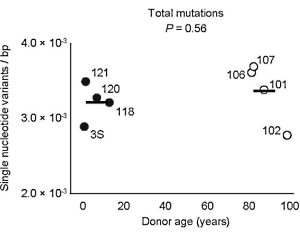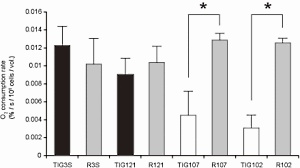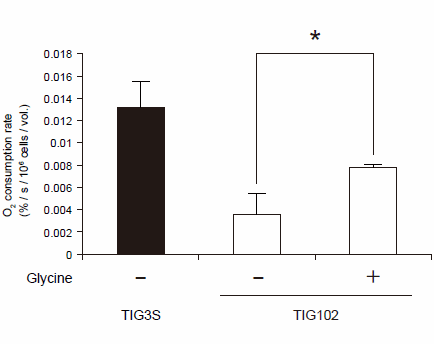|
Glycine rejuvenates old cells
The dirt-cheap, simple amino acid glycine may be an anti-aging substance. We draw this bold conclusion, ignorant but arrogant compilers of this free webzine that we are, from an in-vitro study published in Scientific Reports by researchers at the University of Tsukuba in Japan. In any case, it seems that glycine reverses the aging process in connective tissue cells – and who knows, perhaps in other types of cells too.
Mitochondrial aging
The Japanese were studying mitochondrial aging. Mitochondria are really a different kind of cell that millions of years ago started to co-exist with the types of cells we are made up of. They have their own DNA and are specialised in converting nutrients into energy. They are our cells' power stations.
Researchers who study aging suspect that mitochondria play a role in the process of aging. One popular theory sees the mitochondria of older cells as aging nuclear reactors, which are increasingly polluting their surroundings – and as a result causing cells to age. You'd be able to measure this by counting the number of genetic errors in the DNA of mitochondria.
But the Japanese, who compared the fibroblasts of young and old people, didn't observe this increase in genetic errors. What they did see was that older mitochondria worked less hard. Older fibroblasts used less oxygen, which would indicate that their mitochondria produced less energy.


So the aging of fibroblasts is apparently not so much a consequence of polluting power stations, but more that of an energy crisis.
Rejuvenation
The Japanese performed a number of gen-tech tricks on the older fibroblasts and managed to transform them into stem cells. These tricks don't work in living organisms, by the way, but you can use them to rejuvenate cells in test tubes. After doing this, the researchers observed that the mitochondria started to generate more energy again as a result of the rejuvenation.
TIG3S and TIG121: young fibroblasts. R3S and R121: rejuvenated versions of TIG3S and TIG121 respectively.
TIG107 and TIG102: very old fibroblasts. R107 and R102: rejuvenated versions of TIG107 and TIG102 respectively.

Genetic activity
The researchers then measured the activity of the mitochondrial genes in their young and old and rejuvenated fibroblasts, and discovered that it was mainly the working of the GCAT gene that was related to the cells' energy expenditure. GCAT was very active in young fibroblasts, less active in old fibroblasts, but again very active in the rejuvenated fibroblasts. [Figure]
The Japanese conducted an experiment in which they used molecular technology to deactivate the GCAT gene in young fibroblasts [shGCAT]. Their energy expenditure decreased. They then used gen-tech to activate the GCAT gene in very old fibroblasts [tgGCAT]. Their energy expenditure increased.

Glycine
According to earlier studies, GCAT is involved in the production of glycine by cells. And while they were at it, the Japanese decided to do another experiment in which they exposed old fibroblasts [TIG102] to glycine. And lo and behold: their energy expenditure increased. True, it didn't rise to the level of a very young fibroblast [TIG3S], but even so.

Conclusion
It may be the case that we now have a supplement that delays delays aging at a fundamental level. And if that’s the case, it's not necessarily good news for the supplements industry. Glycine is readily available and dirt cheap.
Source:
Sci Rep. 2015 May 22;5:10434.
More:
Cacao extends your life expectancy and keeps you sharp 16.08.2014
You'll live longer if your diet contains lots of vitamin K 20.05.2014
Glucosamine, the life extender 22.04.2014
Archives:
Amino Acids
Longevity
Glycine
 |
 |
 |
|
SkQ1 extends lifespan through the immune system
According to reports on web forums such as Longecity, which are frequented by the better-informed life extensionists, in the longevity scene the first experiments with relatively high doses of SkQ1 have started. But what kind of stuff is SkQ1?
|
Ginger, the life-extensionist's spice
In this study, worms lived twenty percent longer due to exposure to 6-gingerol, a substance in ginger.
|
The very first drug against aging is coming
After decades of research, there is still no effective drug that slows down the aging process. There are so many factors involved in aging, that scientists do not know which factor they must use to develop an active remedy for aging.
|
|









